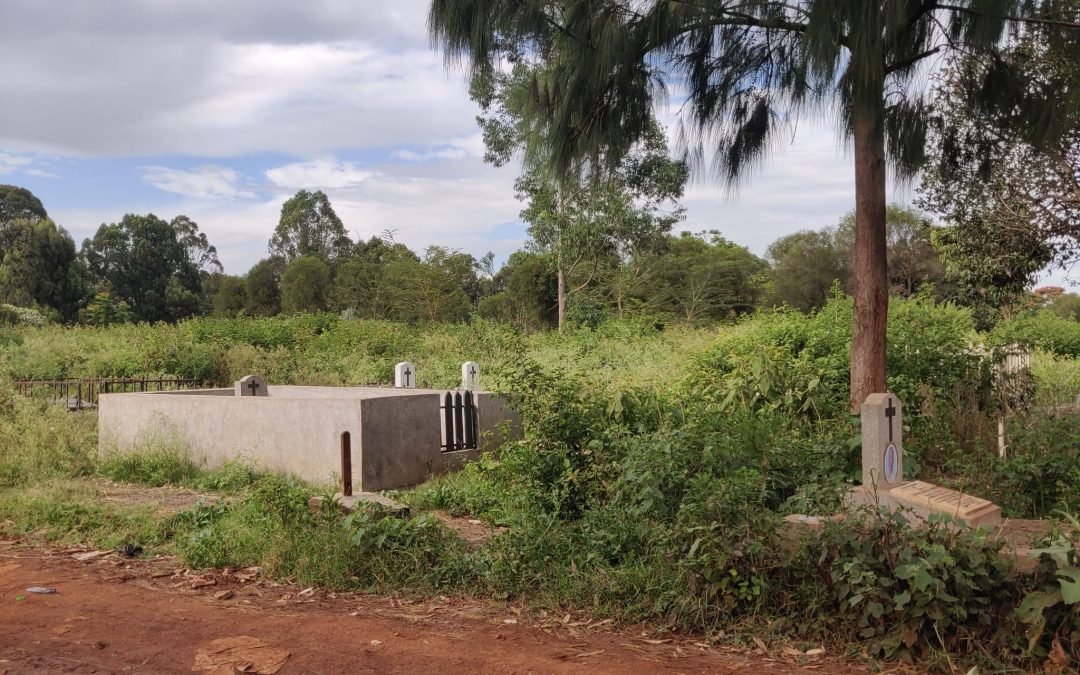The dead are born every day. I know because I am at the Langata Cemetery. There are more fresh graves today. The mud is still virgin, the ground thick and warm and damp and smells like formalin and wet dirt. A fig tree, the modest mistress of solitude, sits alone keeping nobody company. I have been coming here every week. To sit. Mostly to stare at the tombstones—, like over thereeeee, is where romance is buried.
I have eyed some of those who have come here suspiciously because I grew up believing that death is a curtain—some of the dead are on the other side watching, some refuse to cross over to the other side. I once watched a Tanzanian horror movie, Shumileta where the protagonist, Shumileta, took her lover to go and have sex at a cemetery. Fake blood optics aside, he never finished, what the French call la petite mort. I made a mental note not to consent to sex in a cemetery. I denounced tomato sauce too.
A family is huddled a few tombstones down, pale chini. The dead of tomorrow burying the dead of today. Head bowed. Hands joined. Eyes wet. An invigorating emptiness fills me. I writhe in agony. I became obsessed with graveyards when my brother died in 2018, numbing myself with books, music, and the way the sunlight feels if you lie in its path. I wondered who turns the bodies when they are tired of lying supine. I would like to be buried in foetal position, because despite being six feet, I like being the little spoon.
Langata Cemetery was opened in 1958. There are those too silly to believe that the 120-acre site is full, that it got full in 2008, as if the earth ever gets fed up with swallowing. It’s an affordable housing program for the dead. You come. You find a place. You fit in. Kusongeana. Four feet under. Three. One foot under. Depends really. The deeper your pocket, the deeper into the earth you go.
I walk this denuded graveyard. A library of completed lives. Here I intuit stories suggested by short lives, graven names and the very quality of their marble’s carving. There are many whose graves are unattended, their names fading from the earth, and earth. There are others, behind a moat, with a fence and black granite carvings. Even in death we are not equal. Sometimes I sit and I swear, I can hear, in the silence, some of the dead speaking to me. Then I look at the epitaphs and think, I have a foolproof method to identify serial killers: “mm/dd/yyyy.” Those ones. You cannot convince me otherwise. Yyyy/mm/dd? Terrorists/arsonists/crypto bros. If you don’t believe it, just ask me. I will tell you.
Life, for the dead, is within reach of the marble headstones, the comfort in sleeping in friendly proximity to the living. Mahmoud Darwish says graves are mattresses. They seem like comfortable places to sleep, still part of everyday life, cafés, museums, matatus and the social interplay of the living—but retaining the detachment that makes it unnecessary for them to go out for walks after they have spent their life savings on procuring the privacy of this permanent address. The cemetery remains a faithful guardian of the signs: behind the grass and mounds and slabs are dreams buried alive and kingdoms: kingdoms of memory, and life waiting for a frustrated poet who does not like stopping at ruins unless the poem demands it. Every tombstone tells a story. The child that died in infancy. The 2021 Corona victim. The woman with three husbands. The family where everyone was wiped out. The Centenarian. What were their lives like? How did this happen?
Today, I am here because someone I love has been diagnosed with cancer. I told a few people and watched them melt in shock. She’ll be fine, they said. Cancer si big deal siku hizi, they ossify. Which is like watching Manchester City claim they are underdogs, like that scene from the sitcom Arrested Development, where Tobias Funke says, when asked if an open marriage would work, “No, it never does. I mean, these people somehow delude themselves into thinking, it might… but it might work for us.”
I think about Abel, the shepherd, when he won the honour of being the first man to die. And I feel clemency for Cain, the farmer, who after a family quarrel, did that thing the government does when they have enough bullets to shoot stray ones. The shepherd wins the love of God, the farmer leaves. It is, er, a grave concern.
I am here because I am afraid to admit I am afraid. What chance do we stand against kismet? I think about the day when I will eventually have a lover’s quarrel with life. I say farewell to my friend, Njoro, 19/06/2008, and await my turn.







Reading your pieces is always a pleasure. I like to the way you play with words and phrases. AT jibes at gava. Keep it up!
Let’s hope they don’t come at me. Yet.
Like your friends, I don’t know what’s the right way to offer comforting words. I think sometimes we just quote ordinary words because we don’t know what to say. But then is silence an option ? Or just be there with them